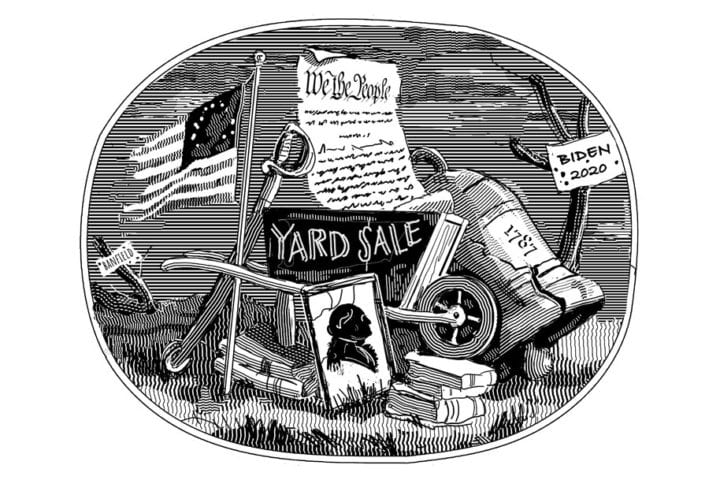Books Reviewed
Victorian leaders really were eminent, Simon Heffer insists in his long and authoritative social, political, and intellectual history, High Minds: The Victorians and the Birth of Modern Britain. A journalist and historian, Heffer argues that we must credit the Victorians with a broad and deep range of reforms that brought archaic systems into alignment with the demands of modernity.
Any 64-year period is bound to see mammoth change, but Heffer makes a largely convincing case that Britain’s leadership class of public-spirited politicians, intellectuals, and activists instituted much more drastic changes than we often credit them for—especially in the 1838–1880 period, when “British life changed almost beyond recognition.” “Although poverty, disease, ignorance, squalor and injustice were far from eliminated,” Heffer writes, “they were beaten back more in those forty or so years than at any previous time in the history of Britain.”
High Minds (which first appeared in the U.K. in 2013 but was published in the U.S. this year) expands outward from a single schoolmaster’s story: Thomas Arnold (father of the education reformer and poet Matthew) shaped the Rugby School into an institution of learning and Christian morality and cast off the “anarchy tempered by despotism” (Lytton Strachey’s words) that characterized the institution upon Arnold’s arrival in 1828. Arnold was the chief engineer of a new approach to the schooling of Britain’s ruling caste that was more focused on educating than flogging.
Heffer explores how, over decades, Corn Laws that amounted to a tax on the poor to benefit the rich were repealed, religious tests that hampered non-adherents to the Church of England were gradually whittled down, the franchise was opened up to a broad group of men via the Reform Act of 1867, oncoming democracy inspired Parliament (which reasoned that it would be dangerous to allow the ignorant to vote) to create a far-reaching compulsory education system, a celebrity author named Caroline Norton helped women achieve their first inkling of liberation through an 1857 law giving them the right to sue their husbands for divorce, and Queen Victoria’s husband, Prince Albert, promoted the diffusion of scientific knowledge by fathering the Great Exhibition of 1851 in the Crystal Palace, the Natural History Museum, and what is today the Victoria and Albert Museum.
***
The Victorians rooted out many deeply entrenched systems that were unjust or indefensible. Take, for example, the way the officer class was reshaped. Rich men who wanted a go at playing colonel would simply purchase the rank. The word “meritocracy” was still decades away from being coined, and the very concept of achieving rank based on fitness for the job was alien to a society in which status and power were handed down from one generation to the next. The Civil Service worked the same way. Yet after then-Chancellor of the Exchequer William Gladstone commissioned a report, published in 1854, from Charles Trevelyan and Stafford Northcote, which outlined how to reorganize the Civil Service around merit, it took until 1870 to put their ideas into effect.
Concurrently with this process, another committee in 1857 castigated the practice of selling commissions—but as the queen’s cousin Prince George, the Duke of Cambridge and the Commander-in-Chief of the Forces, sternly opposed reform, it took a protracted effort by Gladstone to force the transition to merit-based promotion. Gladstone and his pick to head the war office, Edward Cardwell, were so persistent that by July 1871, the duke himself was reduced to telling the House of Lords that buying and selling commissions, a practice he had defended for decades, “cannot be defended for a moment.” As with most reforms, there was a massive hidden cost: since commissions were valuable assets in the families of the officers, it was only fair to make them whole via the public purse at fair market value, which amounted to millions of pounds. In order to abolish purchasing commissions, the government had to purchase all the commissions.
***
Reform rarely comes as easily as idealists wish; blowing up a structure may be the work of a moment for a revolutionary who shrugs at the prospects of chaos, but maintaining stability by painstakingly disassembling and rebuilding flawed institutions takes wisdom, patience, and courage. Heffer admires the progressive zeal of the Liberal Gladstone, “the highest mind of all,” who served four times as prime minister. Surprisingly for an author associated with right-wing papers such as the Daily Mail, Heffer reserves some of his harshest words for Gladstone’s Conservative foil, Benjamin Disraeli, twice prime minister. Heffer rebukes Disraeli as a hypocrite, liar, and opportunist who pursued necessary liberalization only grudgingly and in fear of finding himself at the wrong end of a pitchfork as furious crowds rioted near the House of Commons in Hyde Park in 1866.
If there is a flaw in Heffer’s masterly work, it is that he sometimes goes into unnecessarily exhaustive detail, relating every granular tidbit about important bills as they inched their way into law. His best chapters are the ones that pull back and consider the big picture. Heffer recaps the arguments for and against reform and democracy that were made by some of the era’s heavyweights, notably the Sage of Chelsea, Thomas Carlyle, the reactionary social critic who argued vehemently that democratization would unleash the barbarians. Matthew Arnold, in his most renowned book, Culture and Anarchy (1869), seconded Carlyle’s fears about a Britain deprived of “sweetness and light” after the rabble took over.
That isn’t quite what happened, of course; Heffer ends the book (and sets up his own sequel, The Age of Decadence: A History of Britain, 1880–1914, published in the U.K. in 2017 and in the U.S. in 2021) with a hint about the mores of the partially liberated but still woefully hypocritical era that would follow by mentioning an 1881 letter to Gladstone from a young admirer: Oscar Wilde.




